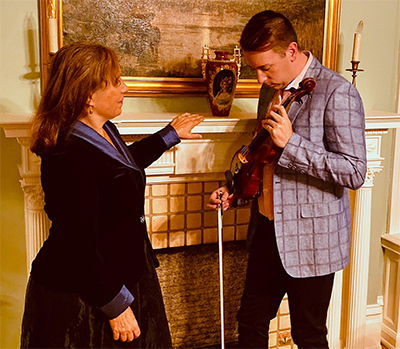by Jarrett Hoffman
TODAY ON THE WEB:
At noon, Trinity Cathedral continues its “Brahms-Fest” on the Virtual Brownbag series, this time with two of the composer’s violin sonatas (Op. 78, No. 1 and Op. 108, No. 2) in the hands of Andrew Sords and pianist Elizabeth DeMio. That will remain available on-demand here.
Also at noon, and also featuring Brahms, is “Lunchtime with The Cleveland Orchestra” on WCLV. The Tragic Overture is paired with Respighi’s La boutique fantasque (“The Fantastic Toyshop”).
Details in our Concert Listings.
TODAY’S ALMANAC / PERSONAL AD / BK PARTY:
A little bit about me: I enjoy long walks on the beach at sunset, and quiet days in classical music history — the kind when you can easily zero in on one or two musicians and give them their proper respect in the daily almanac.
Here’s one way to put May 12 in perspective: if all the important composers who were born on this date decided to celebrate their birthdays at the local Burger King — as we all were once inclined to do — the playpen would be so full of collisions and tears that at some point, each musician would need to be lifted into the air by mom or dad, receive a gentle pat on the back, and be taken home early.
Before arriving at that sad conclusion to the day, the chaotic party would include Czech composer Johann Baptist Wanhal (born 1739), Italian violinist and composer Giovanni Battista Viotti (1755), French composers Jules Massenet (1842) and Gabriel Fauré (1845), American composers Scott Johnson (1952) and Frank J. Oteri (1964), and Chinese American composer and guzheng player Wu Fei (1977).
Amidst plastic balls being thrown point-blank, crashes occurring halfway down the slide, and partly digested Kids Meals making their way onto the carpet, perhaps there would also be the potential for fascinating musical discussions to unfold.
Wu Fei and Viotti might get along as they go back and forth with their virtuosic playing and their own brands of improvisation — the Nashville-based musician showing off her distinct musical language (listen here) that combines Western classical and Chinese traditions with more idiosyncratic sounds of the present day, and the Italian demonstrating his tuneful, Classical-era style and reminiscing about his improv sessions with the pianist Hélène de Montgeroult. In fact, speaking of duos, why not play together? The guzheng, a Chinese plucked zither, can make an intriguing pairing with the violin, as evidenced by several videos on YouTube — here’s one.
Of course, it can be nice in a party setting when a few people already know each other, serving as a nucleus around which everyone else can begin making connections. One such pairing here would be Fauré and Massenet, who were both members of the Société Nationale de Musique, which promoted new French music.
Nevertheless, it’s unclear whether they would make for jovial company together. After all, Fauré replaced Massenet as professor of composition at the Paris Conservatoire — Massenet had resigned from the position after being passed over for the school’s directorship, having apparently insisted on being given a lifetime appointment. I’m not suggesting any mean-spirited feelings between them, but maybe an ounce of awkwardness. Plus, their mutual respect is questionable: one biographer has written that Fauré considered Massenet’s more popular style of writing (one famous example here) to be “based on a generally cynical view of art.”
Finally, Wanhal might just be mystified by the contemporary trio of Fei (see above), Oteri (whose interests have included minimalism and microtonality, like here), and Johnson (known for sampling recorded speech and merging classical and popular music — one example here). But give them a few rounds of burgers and shakes, and some time together in the ball pit, and who knows?




